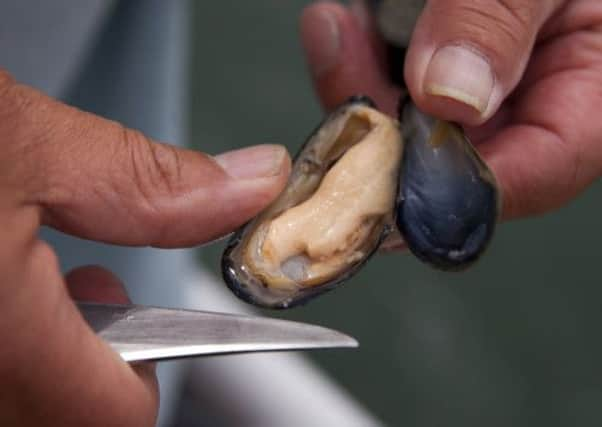Shetland mussel beds closed after toxin outbreak


A voluntary ban on harvesting from all 20 mussel sites on Shetland has been imposed after 11 harvesting areas in waters to the north and west were closed on the orders of Shetland Islands Council.
The suspension was enforced after 70 people in the South of England, including customers at some of London’s top fish restaurants, were taken ill with diarrhetic shellfish poisoning after eating contaminated mussels from the islands.
Advertisement
Hide AdAdvertisement
Hide AdThe acute food poisoning outbreak was traced by the Food Standards Agency to “unusually high” toxin levels from mussels harvested by one of Shetland’s main shellfish fish producers, Shetland Mussels, which is based at Vadlure, Walls, on the Shetland mainland.
Samples showed that the levels of naturally occurring phytoplankton toxins in the mussels had soared from 50 per cent of the safe limit to ten times the safe limit within a week - levels unprecedented in Shetland’s £5 million a year mussel farming industry which accounts for almost 70 per cent of Scotland’s mussel production.
A spokesman for the FSA said: “Following detection by the FSA of unusually high levels of toxins, various shellfish harvesting sites in Scotland have been closed. These toxins, which occur naturally, especially during the summer months, can cause acute food poisoning.
“In addition, the FSA has been informed that approximately 70 people in south east England have reported symptoms consistent with diarrhetic shellfish poisoning. The vast majority of cases occurred between 13 and 15 July.” The customers affected are said to have made a full recovery.
Maggie Sandison, executive manager of environmental health at Shetland Islands Council, said the harvesting ban could last for up to four weeks.
She said: “You normally need to have two clear samples before harvesting can resume. We know that in cases in the West coast of Scotland (toxin levels) continued to go up after the toxins were first recorded.”
Ms Sandison explained that the samples taken on Shetland had gone from 50 per cent below the level at which there was a risk to health, to ten times the safe level between two weekly sampling dates.
She said: “We have toxic outbreaks every year in Shetland but it has never before gone up the level it has done this year. There has been a real spike in the toxins. I believe it is a unique situation.”
Advertisement
Hide AdAdvertisement
Hide AdMichael Tait, the managing director of Shetland Mussels, said: “This is the first time that we have experienced a problem with customer illness in our 16 years of production. We have been proactive in working with the customers and the authorities in investigating this incident.”
Ruth Henderson, chief executive of Seafood Shetland, the islands’ trade association, said: “A full investigation is underway and all systems will be reviewed to ensure that, if such unprecedented circumstances should ever arise again, there will be no threat to the public.
“We very much regret that, although every effort was made to withdraw the mussels from the market, once the problem was discovered, some had already been consumed. We would stress that there is no further threat to public safety. “
She continued: “Diarrhetic shellfish poisoning is caused by naturally occurring algal blooms. The recent warmer temperatures have led to an unprecedented level and increase of algal blooms, which has now resulted in the closure of 13 out of 20 harvesting areas in Shetland. Because shellfish is particularly delicate and susceptible to tainting, growers are always very cautious about maintaining the quality of the product.
“As a result, a voluntary withdrawal of all Shetland mussels from the market has been undertaken until the current high levels of toxins in the water has subsided.”
In June last year the rope grown mussel enhanced fishery on Shetland was awarded the coveted Marine Stewardship Council (MSC) ecolabel certification.